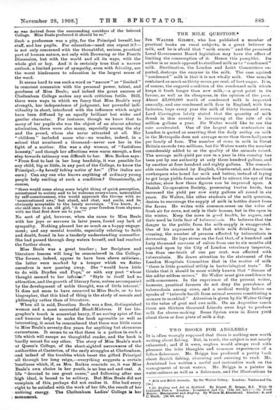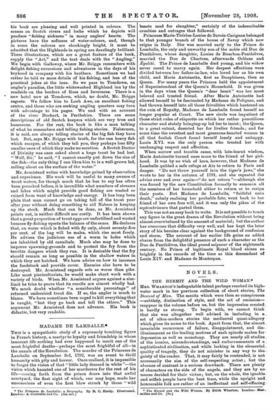TWO BOOKS FOR ANGLERS-t IT is often wrongly supposed that
there is nothing new worth writing about fishing. But, in truth, the subject is not nearly exhausted ; and if it were, anglers would always read with pleasure the trite thoughts and common experiences of a fellow-fisherman. Mr. Briggs has produced a pretty look about Scotch fishing, charming and amusing to read. Mr. Armistead has written a useful and instructive work on the management of trout waters. Mr. Briggs is a painter in water-colours as well as a fisherman, and the illustrations to
• Milk and Much Animals. By Sir Walter (lilbey. London : Vinton and Co.
[11.1 t (1) Angling and Art in Scotland. By Ernest E. Briggs, B.I. With 35 Coloured Plats. Loudon : Lou: mans and Co. [12a. dd. net.]—(2) Trout Watch: Management end Angling. By Wilson M. Armistead. I:widen; A. and C. Black. Les. 641. net.] . . -
his book are pleasing and well printed in colours. The scenes on Scotch rivers and lochs which he depicts will produce "fishing sickness" in many anglers' hearts. The pictures have the softness of water-colours, and, though in some the colours are shockingly bright, it must be admitted that the Highlands in spring are dazzlingly brilliant. These illustrations, which are a great feature of the book, supply the "Art," and the text deals with the "Angling." We begin with Galloway, where Mr. Briggs remembers with delight fishing excursions and adventures in the days of his boyhood in company with his brothers. Sometimes we bad rather he told us more details of his fishing, and less of the practical jokes at the inns. So we pass to Tomdown, an angler's paradise, the little whitewashed Highland inn by the roadside on the borders of Ross and Inverness. There is a • new hotel now at Tomdown, which, no doubt, Mr. Briggs regrets. We follow him to Loch Awe, an excellent fishing centre, and those who are seeking angling quarters may turn with advantage to his pages. We end with an account of the river Dochart, in Perthshire. There are some descriptions of old Scotch keepers which are very true and humorous. For the rest, the book is like a man talking of what he remembers and telling fishing stories. Fishermen, it is said, are always telling stories of the big fish they have lost. Bat, says Mr. Briggs with truth, for the one heavy fish which escapes, of which they tell you, they perhaps lose fifty smaller ones of which they make no mention. A Scotch Doctor of Divinity was once asked about a huge trout he had lost. " Well, Sir," he said, " I cannot exactly put down the size of the fish—the only thing I can liken him to is a well-grown lad, rolling about on the surface of the water."
Mr. Armistead writes with knowledge gained by observation and experience. His work will be useful to many owners of trout waters, for though much that he has to say has often been preached before, it is incredible what numbers of streams and lakes which might provide good fishing are wasted or ruined from want of knowledge and energy. It has long been plain that man cannot go on taking toll of the trout year after year without doing something to aid Nature in keeping up the stock. Much that can be done, as Mr. Armistead points out, is neither difficult nor costly. It has been shown that a great proportion of trout eggs are unfertilised and wasted because fly-fishing upsets the balance of the sexes. He declares that, on water which is fished with fly only, about seventy-five per cent. of the bag will be males, which rise most freely. He advises the judicious use of a worm in holes which are inhabited by old cannibals. Much also may be done to improve spawning-grounds and to protect the fry from the terrible dangers which they run. It is desirable that the fry should remain as long as possible in the shallow waters in which they are hatched. We have advice on bow to increase the foodstock and provide cover. Enemies also have to be destroyed. Mr. Armistead regards eels as worse than pike. Like most pisciculturists, he would make short work with a variety of birds. When Mr. Armistead argues against a size- limit he tries to prove that its results are almost wholly bad. We much doubt whether "a considerable percentage" of returned undersized trout die. If so, the angler is much to blame. We have sometimes been urged to kill everything that is caught, "lest they go back and tell the others." This argument Mr. Armistead does not advance. His book is didactic, but very readable.



















































 Previous page
Previous page